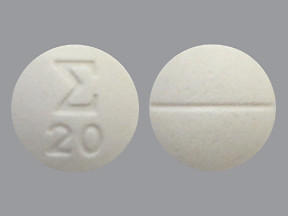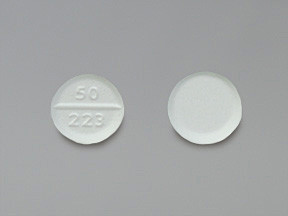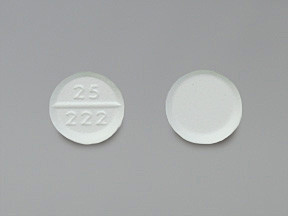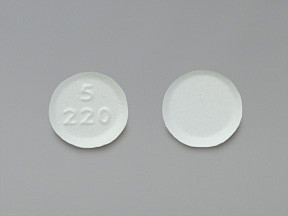LIOTHYRONINE - ORAL
PHONETIC PRONUNCIATION: (LYE-oh-THYE-roe-neen)
COMMON BRAND NAME(S): Cytomel
GENERIC NAME(S): liothyronine sodium
Uses
USES: Liothyronine is used to treat an underactive thyroid (hypothyroidism). It replaces or provides more thyroid hormone, which is normally made by the thyroid gland. Liothyronine is a man-made form of thyroid hormone. Low thyroid hormone levels can occur naturally or when the thyroid gland is injured by radiation/medications or removed by surgery. Having enough thyroid hormone helps you stay healthy. For children, having enough thyroid hormone helps them grow and learn normally. This medication is also used to treat other types of thyroid problems (such as certain types of goiters, thyroid cancer). It can also be used to test for certain types of thyroid disease. This medication should not be used to treat infertility unless it is caused by low thyroid hormone levels.
How to use LIOTHYRONINE - ORAL
HOW TO USE: Take this medication by mouth with or without food as directed by your doctor, usually once daily. It is best to take it at the same time each day so your thyroid hormone level is kept at a constant level. Take this medication regularly to get the most benefit from it. Do not stop taking it without first talking with your doctor. Thyroid replacement treatment is usually taken for life. The dosage is based on your medical condition, age, lab test results, and response to treatment. Certain medications can decrease the absorption of liothyronine. Examples include products that contain aluminum or magnesium, antacids, sucralfate, calcium supplements, iron, bile acid-binding resins (such as cholestyramine, colestipol, colesevelam), simethicone, sevelamer, sodium polystyrene sulfonate, among others. If you take any of these medications, take them at least 4 hours before or after liothyronine. If you take lanthanum, take it at least 2 hours before or after liothyronine. Symptoms of low thyroid hormone levels include tiredness, muscle aches, constipation, dry skin, weight gain, slow heartbeat, or sensitivity to cold. You may see an improvement in these symptoms within a few days. Tell your doctor if you do not get better or if you get worse.
Side Effects
Precautions
Interactions
Overdose
Images
Reviews
Faq for LIOTHYRONINE - ORAL
Liothyronine is a medication that contains a synthetic form of the thyroid hormone triiodothyronine. It is used to treat an underactive thyroid (hypothyroidism) or to treat certain types of thyroid cancer.
Liothyronine works by replacing or supplementing the natural thyroid hormone in the body. It increases the levels of thyroid hormone, which helps in regulating metabolism, energy levels, and other bodily functions.
Common side effects of Liothyronine may include headache, nervousness, irritability, increased sweating, sleep problems, changes in appetite, weight changes, and irregular menstrual periods. If you experience any severe or persistent side effects, consult your doctor.
Liothyronine is usually taken orally, usually once or twice daily, with or without food. It is important to follow your doctor's instructions and dosage recommendations. Do not stop or change the dosage without consulting your doctor.
Liothyronine is considered safe during pregnancy. However, the dosage may need to be adjusted, so it is crucial to consult your doctor. Liothyronine can pass into breast milk, but it is unlikely to harm a nursing infant. Still, discuss the risks and benefits with your doctor.
If you miss a dose, take it as soon as you remember. However, if it is close to the time for the next dose, skip the missed dose and continue with your regular dosing schedule. Do not take a double dose to make up for a missed one.
Liothyronine may interact with certain medications, such as blood thinners, diabetes medications, antidepressants, and certain heart medications. It is important to inform your doctor about all the medications you are taking to avoid any potential interactions.
The onset of action for Liothyronine can vary between individuals. Some people may start noticing improvement in their symptoms within a few days, while others may take weeks. Your doctor will monitor your progress and adjust the dosage if necessary.
Liothyronine is not approved or recommended for weight loss purposes. Using Liothyronine for weight loss without a medical indication can be dangerous and should be avoided.
Warning
WARNING: This medication should not be used for weight loss. Normal doses of this medication will not work for weight loss, and large doses may cause serious, possibly fatal side effects, especially when taken with diet pills.
Disclaimer
IMPORTANT: HOW TO USE THIS INFORMATION: This is a summary and does NOT have all possible information about this product. This information does not assure that this product is safe, effective, or appropriate for you. This information is not individual medical advice and does not substitute for the advice of your health care professional. Always ask your health care professional for complete information about this product and your specific health needs.





No Reviews Yet